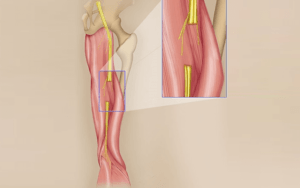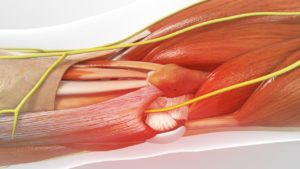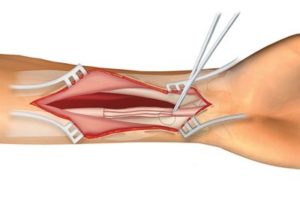Dr. Rao’s Hospital cures and cares to make happy patients
Dr. Rao’s Hospital is the best peripheral nerve surgery treatment hospital in Guntur. Dr. Mohana Rao Patibandla, the founder of Dr. Rao’s Hospitals, is an accomplished neurosurgeon and experience in handling complex neurosurgery cases including peripheral nerve surgery.
Symptoms
Experiencing burning sensation, constant and severe pain, numbness, tingling sensation in the damaged nerve area? The intensity of discomfort and pain varies from mild to serious depending upon the extent of nerve damage and can hamper daily activities. These are the significant symptoms of peripheral nerve damage.

What are peripheral nerves?
Peripheral nerves relay messages from the brain and the spinal cord to all the organs of the body. The body can move, feel, and even sense depending upon these messages and signals. The peripheral nerves are very delicate and sensitive; they can be damaged very easily. They are made from axons – a type of fibres, while the tissues surrounding offer insulation and protection to the peripheral nerves.
Any damage to the nerve injury is referred to as peripheral neuropathy. This injury affects the communication ability of the brain with the rest of the body.

Causes
There are several instances that lead to damage in the peripheral nerves –
- Medical issues – Carpal tunnel syndrome, Diabetes, Guillain-Barre syndrome
- Health conditions – Sjogren’s syndrome, Rheumatoid Arthritis, Lupus
- Injury and Trauma – Accident, hurt or fall while playing sports, leading to stretching, crushing, Brachial plexus injuries, Ulnar or peroneal nerve compression
- Other causes are hormonal imbalances, tumours, and narrowing of arteries.
Important – Early diagnosis and prompt medical treatment of peripheral nerve injury is a must for a timely recovery. Any delay in treatment of peripheral nerves can lead to permanent damage and further complications.
Diagnosis
Patients can visit Dr. Rao’s Hospitals to consult a peripheral nerve surgery doctor in Guntur.
Neurosurgeons will conduct a physical examination of the patient. They will also rely on the results of imaging and screening tests such as
- EMG and nerve conduction studies
- MRI-an imaging to detect the presence of peripheral nerve tumours, traumatic injury, post-irradiation neuritis, chronic compression, and some pain syndromes.
Treatment of Peripheral Nerve Injury
The cause and the extent of the peripheral nerve injury determine the course of treatment. Injured nerves heal faster. Cut or severely damaged nerves need special treatment and take a lot of time to heal.
Nerves recover at a slow pace, and hence it may take a couple of months or years for a full recovery. At times, physical therapy is recommended to resolve stiffness and regain functionality.

The severity of the symptoms depends on the type of seizure. A person with epilepsy will have the same form of seizure every time so that the symptoms will be consistent from episode to episode.
Seizures are classified as either focal or generalized seizures, depending on how the irregular brain activity starts. Now that you know the symptoms of epilepsy let us discuss the causes.
Peripheral Nerve Surgery Treatment
In case nerve injuries do not heal as expected, then the neurosurgeon will recommend surgery after proper screening.
Surgical exploration of complex or scarred nerve injuries – It may so happen that the nerve is resting in a tight space for which the surgeon will widen the space to free the nerves.
Nerve grafting for repair – The surgeon may perform a nerve repair surgery to remove the damaged section of the nerves and rejoin the ends of the healthy nerves or perform a nerve graft to help the nerves regrow.
The surgeon will perform surgery to restore the function of the critical muscles in the event of a severe nerve injury. In this surgery, the surgeon will transfer tendons from a healthy muscle to a muscle with severe nerve damage.
Neurolysis – This surgery is performed to treat the management of peripheral nerve lesions, especially radial, ulnar, and median nerve lesions. It is performed internally or externally on intact nerves.
Surgical Revision of painful neuromas – Painful neuromas are excised while the nerve is relocated where there is minimal contact or pressure during day-to-day activities, which reduces the extent of pain the patient is likely to experience frequently.
Excision of nerve sheath tumour – This surgery focuses on removing the tumour totally and preserving the nerves. Nerve repair surgery is also performed along with tumour removal surgery.
Non-surgical treatments to treat damaged peripheral nerves are
Electrical stimulation – Electrical stimulation helps to restore the muscles that contain the damaged nerves during their regrowing phase.
Splints or Braces – The patient can experience improved muscle function in the fingers, hand, or foot, or limbs by wearing braces and/or splints. Braces and splints ensure that the affected organs stay in their proper place and positions.
Physical Therapy and Exercise – Physical therapy and exercise are essential to recovering the mobility and functionality of the affected joints and muscles. They reduce muscle cramps, maintaining range of motion and improving muscle strength.
